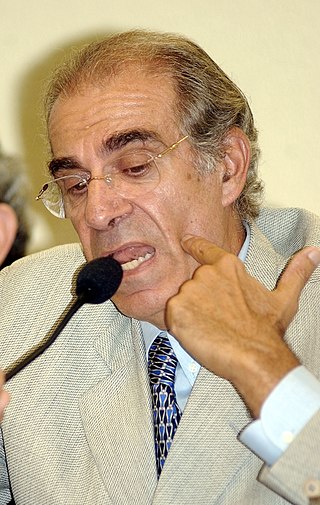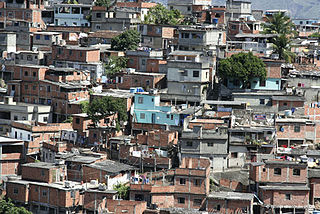
Rio de Janeiro is one of the 27 federative units of Brazil. It has the second largest economy of Brazil, with the largest being that of the state of São Paulo. The state, which has 8.2% of the Brazilian population, is responsible for 9.2% of the Brazilian GDP.

Favela is an umbrella name for several types of impoverished neighborhoods in Brazil. The term, which means slum or ghetto, was first used in the Slum of Providência in the center of Rio de Janeiro in the late 19th century, which was built by soldiers who had lived under the favela trees in Bahia and had nowhere to live following the Canudos War. Some of the last settlements were called bairros africanos. Over the years, many former enslaved Africans moved in. Even before the first favela came into being, poor citizens were pushed away from the city and forced to live in the far suburbs.

The Bororo are indigenous people of Brazil, living in the state of Mato Grosso. They also extended into Bolivia and the Brazilian state of Goiás. The Western Bororo live around the Jauru and Cabaçal rivers. The Eastern Bororo (Orarimogodoge) live in the region of the São Lourenço, Garças, and Vermelho Rivers. The Bororo live in eight villages. The Bororo are an ethnic group in Brazil that has an estimated population of just under two thousand. They speak the Borôro language and are mainly of animistic belief. They live in eight villages in the central areas of Mato Grosso. A famous exponent of this group is Cândido Rondon, a Brazilian army official and founder of Fundação Nacional do Índio. Bororo's culture was closely studied by French anthropologist Claude Lévi-Strauss during his expedition to Amazonia and Mato Grosso (1935–1936), described in his famous book Tristes Tropiques (1955).

Rocinha is a favela in Brazil, located in Rio de Janeiro's South Zone between the districts of São Conrado and Gávea. Rocinha is built on a steep hillside overlooking Rio de Janeiro, and is located about one kilometre from a nearby beach. Most of the favela is on a very steep hill, with many trees surrounding it. Around 200,000 people live in Rocinha, making it the most populous in Rio de Janeiro.

Black Orpheus is a 1959 romantic tragedy film directed by French filmmaker Marcel Camus and starring Marpessa Dawn and Breno Mello. It is based on the play Orfeu da Conceição by Vinicius de Moraes, which set the Greek legend of Orpheus and Eurydice in a contemporary favela in Rio de Janeiro during Carnaval. The film was an international co-production among companies in Brazil, France and Italy.

Marshal Cândido Mariano da Silva Rondon was a Brazilian military officer most famous for his telegraph commission and exploration of Mato Grosso and the western Amazon basin, as well as his lifelong support for Indigenous Brazilians. He was the first director of Brazil's Indian Protection Service or SPI and supported the creation of the Xingu National Park. The Brazilian state of Rondônia is named after him.

Celso Augusto Daniel was the mayor in 2002 for the third time of the city of Santo André in São Paulo, Brazil, as a representative of the Workers' Party (PT). He was kidnapped and murdered in the same year.
Brazilian hip hop is a national music genre in Brazil. From its earliest days in the African-Brazilian communities of São Paulo and Rio de Janeiro, the genre has grown into a countrywide phenomena. Rappers, DJs, break dancers and graffiti artists are active across the complete spectrum of society blending Brazil's cultural heritage with American hip hop to form a contemporary musical fusion.

Antônia is a 2006 Brazilian drama musical film which tells the story of Antônia, an Afro-Brazilian hip-hop girl group formed by four young women living on a favela of São Paulo. On their way to the mainstream success, they have to face with the violence near their homes and the sexism of the musical business. The film was directed by Tata Amaral and stars Negra Li, Cindy Mendes, Leilah Moreno and Quelynah as the members of the group.

Brazil ranks 49.3 in the Gini coefficient index, with the richest 10% of Brazilians earning 43% of the nation's income, the poorest 34% earn less than 1.2%.

The National Public Security Force was created in 2004 and is headquartered in Brasília, in the Federal District, as a joint cooperation of various Brazilian Public Safety forces, co-ordinated by the National Secretariat of Public Security, of the Ministry of Justice. It was created during the administration of President Luiz Inácio Lula da Silva, as a concept developed by then Minister of Justice, Márcio Thomaz Bastos.

The Roman Catholic Metropolitan Archdiocese of Aracaju is a Latin Metropolitan archdiocese in the State of Sergipe, northeastern Brazil. Its cathedral archiepiscopal see is Our Lady of the Conception Cathedral, dedicated to Our Lady of Immaculate Conception, in the city of Aracaju. Two World Heritage Sites are owned by the Archdiocese in São Cristóvão, Sergipe: the Misericórdia Hospital and Church and the Church and Convent of Santa Cruz, also known as the Church and Convent of Saint Francis.

Guiratinga is a city in the state of Mato Grosso, Brazil, distant about 320 miles from the capital Cuiabá. Like many cities in the region, its foundation is directly linked to mining activity that began in the 1920s.

Adenízia Aparecida Ferreira da Silva is a Brazilian volleyball player who plays as a middle blocker for Pallavolo Scandicci.

Ruth Pinto de Souza was a Brazilian actress.
The Ultimate Fighter: Brazil 4 was an installment of the Ultimate Fighting Championship (UFC)-produced reality television series The Ultimate Fighter. It was the eighth international series and the fourth to feature mainly Brazilian fighters.

Marielle Franco was a Brazilian politician, sociologist, feminist, socialist and human rights activist. Franco served as a city councillor of the Municipal Chamber of Rio de Janeiro for the Socialism and Liberty Party (PSOL) from January 2017 until her assassination.

The armed conflict for control of the favelas in Greater Rio de Janeiro or simply Civil conflict for control of the favelas is an ongoing conflict between Brazilian militias, organized criminal groups Comando Vermelho, Amigos dos Amigos, Terceiro Comando Puro and the Brazilian state.

Anielle Francisco da Silva is a Brazilian politician from the Workers' Party who has been Minister of Racial Equality in the second cabinet of Lula da Silva since 1 January 2023.
Moisés Lino e Silva is a social anthropologist, professor at the Federal University of Bahia in Brazil and a World Social Science fellow of the International Social Science Council. He is originally from Goiás. The scholar is an editorial board member of Cadernos de Campo, an anthropology journal published by the University of São Paulo. In 2019, he won the Global Religion Research Initiative Award, given by the University of Notre Dame. Lino e Silva was also named an ALARI Fellow (2019-2020) at Harvard University. He was appointed visiting associate professor in women's and gender studies at Harvard University in the Fall 2023, where he taught "Queer Lives in the Global South" and "Queer Ethnographies."
















